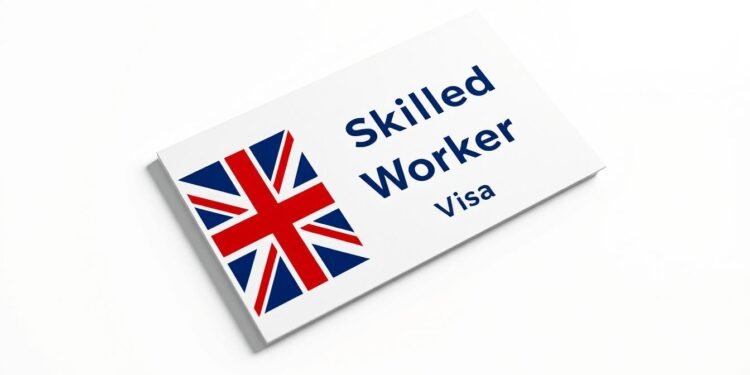Are you considering working abroad but unsure where to start? The process of obtaining a work visa can seem daunting, especially with evolving regulations. Understanding the requirements and timelines is crucial for a smooth application process.
The UK’s points-based system is designed to ensure that only qualified individuals meet the criteria. Applicants must score a minimum of 70 points, which includes mandatory and tradeable factors. Employer sponsorship is a key component, as a Certificate of Sponsorship (CoS) is required to proceed.
In 2025, significant changes are expected, including higher salary thresholds and stricter skill level requirements. These updates aim to streamline the process while ensuring that only the most qualified candidates are selected. Additionally, dependents of visa holders may also be eligible to apply, offering a pathway to long-term residency.
Key Takeaways
- The points-based system requires a minimum of 70 points for eligibility.
- Employer sponsorship and a Certificate of Sponsorship are essential.
- 2025 changes include increased salary thresholds and skill level requirements.
- Dependents may be eligible to apply alongside the primary applicant.
- The Home Office oversees the visa application process.
Introduction to the UK Skilled Worker Visa
Navigating the requirements for international employment requires clarity and preparation. The skilled worker visa replaced the Tier 2 (General) system, offering a streamlined pathway for professionals to fill approved roles in the country. This visa is designed to address labor shortages in specific industries, ensuring that only qualified candidates are selected.
To qualify, applicants must secure a job offer from an approved sponsor and meet the eligibility criteria, including an eligible SOC code and points accumulation. A certificate sponsorship is also mandatory, confirming the employer’s support for the application.
Family provisions are another key feature of this visa. Spouses, partners, and children can apply as dependents, making it easier for families to relocate together. Additionally, the visa offers a pathway to indefinite leave to remain (ILR) after five years, providing long-term stability.
Looking ahead, the post-2025 landscape will introduce stricter skill and salary thresholds for new applicants. These changes aim to ensure that only the most qualified individuals are selected, further enhancing the program’s effectiveness.
Understanding the Points-Based System
Understanding the points-based system is essential for meeting eligibility requirements. This system ensures that only qualified candidates meet the standards for international employment. Applicants must earn a minimum of 70 points, divided into mandatory and tradeable categories.
Mandatory Points Criteria
To qualify, applicants must secure 50 mandatory points. These include a valid Certificate of Sponsorship (20 points), English proficiency at B1 level (10 points), and a role at RQF6+ level (20 points). These criteria are non-negotiable and form the foundation of the application process.
Tradeable Points Criteria
The remaining 20 points can be earned through various salary models. Options A-J offer different thresholds to meet the required score. For example, a higher salary can compensate for other tradeable factors. Starting in 2025, roles below RQF6 will be eliminated, except for transitional cases.
Additionally, the hourly wage floor for most non-healthcare roles is set at £17.13. Special provisions are available for PhD holders, with discounts for STEM and non-STEM fields. These updates aim to align with evolving immigration rules and ensure fairness in the selection process.
Eligibility Criteria for the UK Skilled Worker Visa
Meeting the eligibility criteria for international work involves specific steps. To qualify, applicants must fulfill key requirements, including a valid job offer, language proficiency, and financial stability. These elements ensure that only qualified candidates are selected.
Job Offer and Sponsorship
A valid job offer from an approved sponsor is essential. Employers must hold a valid license with an A-rating to issue a Certificate of Sponsorship (CoS). This document confirms the employer’s support and is a mandatory part of the application process.
English Language Requirement
Applicants must demonstrate proficiency in the english language at a B1 CEFR level. Exemptions apply to nationals from majority English-speaking countries or those with previous UK degrees. This requirement ensures effective communication in the workplace.
Financial Maintenance Requirement
Proof of financial maintenance is another critical criterion. Applicants must show personal savings of at least £1,270 held for 28 days. Alternatively, the sponsor can guarantee financial support for the first month. Additional funds are required for dependents, with £635-£690 per family member.
Documentation such as bank statements or CoS declarations serves as evidence. Meeting these criteria ensures a smooth application process and increases the chances of approval.
Certificate of Sponsorship (CoS)
Securing the right documentation is a critical step in the process of working internationally. The certificate sponsorship is a mandatory requirement for applicants seeking to work abroad. It serves as proof that an approved employer supports the application.
There are two types of CoS: Defined and Undefined. A Defined CoS is required for overseas applicants and involves Home Office approval. This process ensures that the role meets specific criteria before the certificate sponsorship is issued. The application fee for a Defined CoS is £525.
Undefined CoS, on the other hand, is used for in-country switches. Employers receive annual quotas based on their size and needs. This allocation system helps streamline the process for existing workers transitioning to new roles.
Defined vs. Undefined CoS
Both types of CoS have a validity period of three months from the issue date. Employers must ensure accuracy in reporting PAYE salaries and assigning the correct SOC codes. Mismatched job descriptions or SOC codes are common errors that can lead to application refusals.
Employers also have responsibilities, such as maintaining accurate records and ensuring compliance with immigration rules. By understanding these requirements, applicants and sponsors can avoid delays and ensure a smooth process.
Application Process for the UK Skilled Worker Visa
Applying for a work permit involves a structured process that requires attention to detail. The visa application begins with securing a Certificate of Sponsorship (CoS) from an approved employer. Once you have the CoS, you can proceed to the online form and biometrics submission.
Online Application
The online form is the first step in the visa application process. You’ll need to provide personal details, job information, and your CoS reference number. After submitting the form, you’ll schedule a biometrics appointment to provide fingerprints and a photo.
Supporting Documents
Gathering the right supporting documents is crucial for a successful application. These include a valid passport, proof of English proficiency, and a tuberculosis (TB) test if applicable. For certain roles, an Academic Technology Approval Scheme (ATAS) certificate may also be required.
Processing times vary depending on your location. Applications submitted within the country typically take up to eight weeks, while overseas submissions are processed in about three weeks. Priority services are available for an additional application fee, reducing processing times significantly.
After submission, you can track your application’s progress online. If your application is refused, review the reasons provided and consider reapplying with corrected documentation. Proper preparation and attention to detail can help ensure a smooth process.
Timeline for the UK Skilled Worker Visa
Planning your move abroad involves understanding the timeline for your work permit. Knowing each step helps you prepare and avoid delays. The process includes several stages, each with its own timeframe.
The pre-application phase involves verifying the SOC code, which typically takes 1-2 weeks. This ensures your role meets the required standards. Next, securing a Certificate of Sponsorship (CoS) can take 1-3 weeks, depending on the type of CoS.
Biometric scheduling varies by location, usually taking 1-4 weeks. After submitting your visa application, decision timelines differ. Overseas applications are processed in about 3 weeks, while in-country submissions take up to 8 weeks.
Contingency planning is essential. Buffer periods help manage complex cases or unexpected delays. Staying informed about processing times ensures a smoother experience.
Costs Associated with the UK Skilled Worker Visa
Understanding the financial aspects of your application is crucial for proper planning. The total expenses include the application fee, immigration health surcharge, and a skills charge. These costs ensure you meet all requirements for your work permit.
The application fee ranges from £304 to £590, depending on your location and application type. Additionally, the immigration health surcharge is £1,035 per year, providing access to healthcare services during your stay. Employers may also incur a skills charge ranging from £364 to £1,000.
For dependents, fees are typically 50-100% of the main applicant’s costs. Payment methods include credit cards and bank transfers, ensuring flexibility. Refund policies are available but depend on specific conditions, such as application refusal.
Sponsorship Duties for Employers
Employers play a critical role in ensuring compliance with immigration rules. As a sponsor, you must fulfill specific sponsor duties to maintain your license and avoid penalties. These responsibilities include conducting right-to-work checks and monitoring employee attendance.
Reporting changes is another key requirement. Employers must notify authorities of any employee absences or role changes within 10 days. This ensures transparency and helps maintain compliance with visa conditions.
License maintenance is essential to avoid suspension or revocation. Employers must keep accurate records and be prepared for compliance visits from the Home Office. These inspections ensure adherence to immigration rules and verify that all sponsor duties are being met.
Failure to comply can result in severe penalties. Fines can reach up to £20,000 per violation, making it crucial for employers to stay informed and proactive. By understanding and fulfilling these responsibilities, you can ensure a smooth process for both your business and your employees.
Skilled Worker Visa Changes in 2025
The landscape for international employment is evolving rapidly. Starting in 2025, significant updates will impact how professionals apply for jobs abroad. These changes aim to streamline the process while ensuring only the most qualified candidates meet the criteria.
Increased Skill and Salary Thresholds
One of the most notable updates is the higher salary threshold. The general minimum will rise to £41,700, ensuring that only high-earning roles qualify. Additionally, the skill level requirement will be set at RQF6+, meaning only advanced roles will be eligible.
For hourly workers, the wage floor will increase to £17.13. This change aims to align with evolving immigration rules and ensure fairness in the selection process. Sectors like hospitality and retail will be most affected, as many roles fall below the new thresholds.
Transitional Measures and Exceptions
Existing workers will be protected until 2030, allowing time for adjustment. The Temporary Shortage List will also phase out, replaced by stricter criteria. However, healthcare roles will continue to sponsor RQF3-5 positions until 2028, addressing critical labor shortages.
Looking ahead, a potential B2 English requirement may be introduced. This change would further ensure that candidates meet high communication standards. Staying informed about these updates is essential for a smooth application process.
Health and Care Worker Visa
For healthcare professionals, working internationally offers unique opportunities and challenges. The health and care worker visa is designed to address labor shortages in critical sectors like the NHS. This visa provides a streamlined pathway for qualified individuals to contribute to essential services.
Eligibility for this visa requires specific SOC codes, such as 6135 or 6136, which are tailored to healthcare roles. Applicants must meet a salary threshold of £25,000 for care positions. This ensures that only qualified professionals are selected for these vital roles.
One of the significant financial benefits of this visa is the exemptions from the immigration health surcharge. This makes it more accessible for healthcare workers to relocate without the burden of additional costs. However, dependants of those in RQF3-5 roles face new restrictions, limiting their eligibility.
Switching to this visa requires at least three months of employment in the country. This ensures that applicants have a proven track record in their field. Additionally, compliance with Care Quality Commission (CQC) registration mandates is essential for maintaining standards in healthcare services.
By understanding these requirements, healthcare professionals can navigate the application process with confidence. This visa not only supports their career growth but also addresses critical needs in the healthcare sector.
Extending or Switching to a Skilled Worker Visa
If you’re already working abroad and considering staying longer, understanding the process to extend visa status is essential. Whether you’re looking to continue with your current employer or switch roles, the requirements are straightforward but require careful attention.
To extend visa status, you must maintain continuous employment with the same sponsor and meet the salary threshold. Keeping payslips and P60s as evidence is crucial for a smooth application process. These documents prove your eligibility and help avoid delays.
Switching from other permits, such as Student, Graduate, or Intra-company visas, is also an option. The process is seamless, with no cooling-off period, allowing you to transition without interruption. This flexibility makes it easier to continue your career abroad.
After five years of continuous employment, you may be eligible for indefinite leave. Meeting requirements like passing the Life in the UK test and maintaining a clean criminal record are essential steps. This pathway offers long-term stability and the opportunity to settle permanently.
By understanding these criteria and preparing the necessary documentation, you can ensure a smooth transition or extension of your work permit. Staying informed and organized is key to success.
Dependants of Skilled Worker Visa Holders
Relocating with family requires careful planning and understanding of the rules. If you’re moving abroad for work, your dependants—spouses, partners, and children—can join you. However, they must meet specific criteria to qualify.
To apply, you’ll need to provide proof of your relationship. This includes marriage certificates or evidence of cohabitation for partners. For children, age limits apply, with exceptions for existing dependents under 18.
Meeting the financial requirements is also essential. Partners must show £635 in savings, while the first child requires £690. These funds must be held for at least 28 days before the application.
Dependents also need to meet health requirements, such as a tuberculosis (TB) test if applicable. Once approved, they gain access to state schools and can work without restrictions, making the transition smoother for families.
For EU nationals, Brexit adjustments may apply. Ensure you understand the latest rules to avoid delays. By preparing the necessary documents and meeting the criteria, your family can join you abroad with ease.
Common Pitfalls and How to Avoid Them
Avoiding mistakes in your application can save time and stress. Many applicants face application refusal due to overlooked details. Understanding these common mistakes can significantly improve your chances of approval.
One of the top reasons for refusal is insufficient maintenance funds. Applicants must show proof of financial stability, such as bank statements. Another frequent issue is using an expired Certificate of Sponsorship (CoS). Always verify the CoS validity before submission.
Documentation errors can also lead to delays. Uncertified translations or missing stamps on official documents are common mistakes. Ensure all paperwork is complete and meets the required standards.
SOC code mismatches are another pitfall. Using the ONS coding tool can help assign the correct code for your role. Timing is equally important. Submit your application within the CoS expiration window to avoid application refusal.
In some cases, consulting an immigration specialist is advisable. They can help navigate complex requirements and ensure compliance. Additionally, maintaining a clean criminal record is essential for eligibility.
By addressing these issues proactively, you can streamline the process and increase your chances of success. Preparation and attention to detail are your best tools for avoiding pitfalls.
Conclusion
Preparing for international work requires careful planning and attention to detail. The 2025 changes, including higher salary thresholds and stricter skill requirements, will impact applicants. Transitional provisions offer some flexibility, but staying informed is key to a successful application.
Collaboration between sponsors and employees is essential. Both parties must ensure accurate documentation and timely submissions. Proper preparation, including verifying calculations and using official checklists, can prevent delays or rejections.
Long-term planning is equally important. Understanding the pathway to indefinite leave to remain (ILR) ensures stability for those looking to settle permanently. Seeking legal advice when needed can help navigate complex requirements.
In conclusion, thorough preparation, collaboration, and adherence to timelines are crucial for a smooth process. By following these steps, applicants can increase their chances of securing the necessary visa and achieving their career goals abroad.
FAQ
What is the UK Skilled Worker visa?
The UK Skilled Worker visa allows individuals to work in the UK if they have a valid job offer from an approved employer and meet specific eligibility criteria, including skill and salary thresholds.
How does the points-based system work for this visa?
Applicants must score at least 70 points by meeting mandatory criteria, such as having a job offer and a certificate of sponsorship, and tradeable criteria, like salary level and qualifications.
What are the eligibility requirements for the visa?
You need a valid job offer from a licensed sponsor, meet the English language requirement, and prove you can financially support yourself without public funds.
What is a Certificate of Sponsorship (CoS)?
A CoS is a unique reference number provided by your employer, confirming they are sponsoring you for the role. It can be defined (for overseas applicants) or undefined (for those already in the UK).
How do I apply for the visa?
You must complete an online application, pay the required fees, and submit supporting documents, including your CoS, proof of English proficiency, and financial evidence.
How long does the application process take?
Processing typically takes around three weeks if applying from outside the UK, but it may vary depending on your circumstances.
What are the costs associated with the visa?
Costs include the application fee, the Immigration Health Surcharge, and the certificate of sponsorship fee, which vary based on the job’s skill level and duration.
What are the employer’s sponsorship duties?
Employers must ensure the role meets immigration rules, provide a valid CoS, and report any changes in the employee’s circumstances to the Home Office.
Are there changes to the visa in 2025?
Yes, starting in 2025, the skill and salary thresholds will increase, making it more challenging for some applicants to qualify.
Can I bring dependants on this visa?
Yes, you can bring your spouse, partner, and children under 18, provided you meet the financial requirements to support them.
What are common pitfalls to avoid during the application?
Common mistakes include incomplete applications, incorrect CoS details, and insufficient financial evidence. Double-check all documents before submitting.







